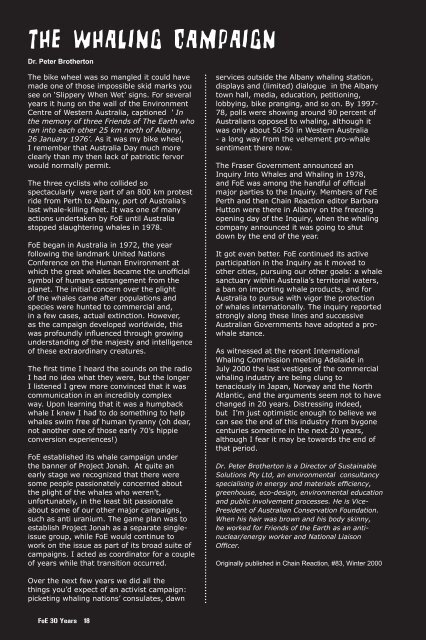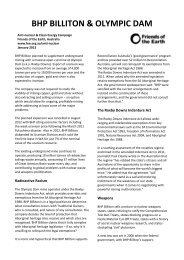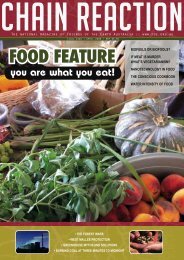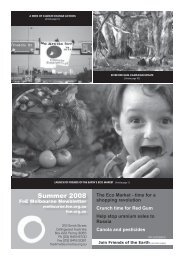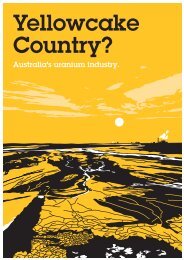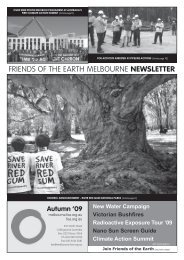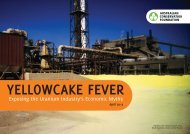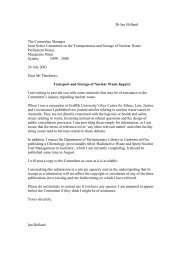Thirty Years of Creative Resistance - Friends of the Earth Australia
Thirty Years of Creative Resistance - Friends of the Earth Australia
Thirty Years of Creative Resistance - Friends of the Earth Australia
You also want an ePaper? Increase the reach of your titles
YUMPU automatically turns print PDFs into web optimized ePapers that Google loves.
Dr. Peter Bro<strong>the</strong>rton<br />
The bike wheel was so mangled it could have<br />
made one <strong>of</strong> those impossible skid marks you<br />
see on ‘Slippery When Wet’ signs. For several<br />
years it hung on <strong>the</strong> wall <strong>of</strong> <strong>the</strong> Environment<br />
Centre <strong>of</strong> Western <strong>Australia</strong>, captioned ‘ In<br />
<strong>the</strong> memory <strong>of</strong> three <strong>Friends</strong> <strong>of</strong> The <strong>Earth</strong> who<br />
ran into each o<strong>the</strong>r 25 km north <strong>of</strong> Albany,<br />
26 January 1976’. As it was my bike wheel,<br />
I remember that <strong>Australia</strong> Day much more<br />
clearly than my <strong>the</strong>n lack <strong>of</strong> patriotic fervor<br />
would normally permit.<br />
The three cyclists who collided so<br />
spectacularly were part <strong>of</strong> an 800 km protest<br />
ride from Perth to Albany, port <strong>of</strong> <strong>Australia</strong>’s<br />
last whale-killing fleet. It was one <strong>of</strong> many<br />
actions undertaken by FoE until <strong>Australia</strong><br />
stopped slaughtering whales in 1978.<br />
FoE began in <strong>Australia</strong> in 1972, <strong>the</strong> year<br />
following <strong>the</strong> landmark United Nations<br />
Conference on <strong>the</strong> Human Environment at<br />
which <strong>the</strong> great whales became <strong>the</strong> un<strong>of</strong>ficial<br />
symbol <strong>of</strong> humans estrangement from <strong>the</strong><br />
planet. The initial concern over <strong>the</strong> plight<br />
<strong>of</strong> <strong>the</strong> whales came after populations and<br />
species were hunted to commercial and,<br />
in a few cases, actual extinction. However,<br />
as <strong>the</strong> campaign developed worldwide, this<br />
was pr<strong>of</strong>oundly influenced through growing<br />
understanding <strong>of</strong> <strong>the</strong> majesty and intelligence<br />
<strong>of</strong> <strong>the</strong>se extraordinary creatures.<br />
The first time I heard <strong>the</strong> sounds on <strong>the</strong> radio<br />
I had no idea what <strong>the</strong>y were, but <strong>the</strong> longer<br />
I listened I grew more convinced that it was<br />
communication in an incredibly complex<br />
way. Upon learning that it was a humpback<br />
whale I knew I had to do something to help<br />
whales swim free <strong>of</strong> human tyranny (oh dear,<br />
not ano<strong>the</strong>r one <strong>of</strong> those early 70’s hippie<br />
conversion experiences!)<br />
FoE established its whale campaign under<br />
<strong>the</strong> banner <strong>of</strong> Project Jonah. At quite an<br />
early stage we recognized that <strong>the</strong>re were<br />
some people passionately concerned about<br />
<strong>the</strong> plight <strong>of</strong> <strong>the</strong> whales who weren’t,<br />
unfortunately, in <strong>the</strong> least bit passionate<br />
about some <strong>of</strong> our o<strong>the</strong>r major campaigns,<br />
such as anti uranium. The game plan was to<br />
establish Project Jonah as a separate singleissue<br />
group, while FoE would continue to<br />
work on <strong>the</strong> issue as part <strong>of</strong> its broad suite <strong>of</strong><br />
campaigns. I acted as coordinator for a couple<br />
<strong>of</strong> years while that transition occurred.<br />
Over <strong>the</strong> next few years we did all <strong>the</strong><br />
things you’d expect <strong>of</strong> an activist campaign:<br />
picketing whaling nations’ consulates, dawn<br />
...................................................................................................................................................................................................<br />
services outside <strong>the</strong> Albany whaling station,<br />
displays and (limited) dialogue in <strong>the</strong> Albany<br />
town hall, media, education, petitioning,<br />
lobbying, bike pranging, and so on. By 1997-<br />
78, polls were showing around 90 percent <strong>of</strong><br />
<strong>Australia</strong>ns opposed to whaling, although it<br />
was only about 50-50 in Western <strong>Australia</strong><br />
- a long way from <strong>the</strong> vehement pro-whale<br />
sentiment <strong>the</strong>re now.<br />
The Fraser Government announced an<br />
Inquiry Into Whales and Whaling in 1978,<br />
and FoE was among <strong>the</strong> handful <strong>of</strong> <strong>of</strong>ficial<br />
major parties to <strong>the</strong> Inquiry. Members <strong>of</strong> FoE<br />
Perth and <strong>the</strong>n Chain Reaction editor Barbara<br />
Hutton were <strong>the</strong>re in Albany on <strong>the</strong> freezing<br />
opening day <strong>of</strong> <strong>the</strong> Inquiry, when <strong>the</strong> whaling<br />
company announced it was going to shut<br />
down by <strong>the</strong> end <strong>of</strong> <strong>the</strong> year.<br />
It got even better. FoE continued its active<br />
participation in <strong>the</strong> Inquiry as it moved to<br />
o<strong>the</strong>r cities, pursuing our o<strong>the</strong>r goals: a whale<br />
sanctuary within <strong>Australia</strong>’s territorial waters,<br />
a ban on importing whale products, and for<br />
<strong>Australia</strong> to pursue with vigor <strong>the</strong> protection<br />
<strong>of</strong> whales internationally. The inquiry reported<br />
strongly along <strong>the</strong>se lines and successive<br />
<strong>Australia</strong>n Governments have adopted a prowhale<br />
stance.<br />
As witnessed at <strong>the</strong> recent International<br />
Whaling Commission meeting Adelaide in<br />
July 2000 <strong>the</strong> last vestiges <strong>of</strong> <strong>the</strong> commercial<br />
whaling industry are being clung to<br />
tenaciously in Japan, Norway and <strong>the</strong> North<br />
Atlantic, and <strong>the</strong> arguments seem not to have<br />
changed in 20 years. Distressing indeed,<br />
but I’m just optimistic enough to believe we<br />
can see <strong>the</strong> end <strong>of</strong> this industry from bygone<br />
centuries sometime in <strong>the</strong> next 20 years,<br />
although I fear it may be towards <strong>the</strong> end <strong>of</strong><br />
that period.<br />
Dr. Peter Bro<strong>the</strong>rton is a Director <strong>of</strong> Sustainable<br />
Solutions Pty Ltd, an environmental consultancy<br />
specialising in energy and materials efficiency,<br />
greenhouse, eco-design, environmental education<br />
and public involvement processes. He is Vice-<br />
President <strong>of</strong> <strong>Australia</strong>n Conservation Foundation.<br />
When his hair was brown and his body skinny,<br />
he worked for <strong>Friends</strong> <strong>of</strong> <strong>the</strong> <strong>Earth</strong> as an antinuclear/energy<br />
worker and National Liaison<br />
Officer.<br />
Originally published in Chain Reaction, #83, Winter 2000<br />
FoE 30 <strong>Years</strong> 18


